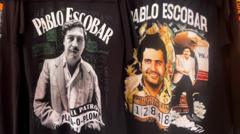The Colombian Congress is currently deliberating a measure that could prohibit the sale of memorabilia celebrating notorious drug lord Pablo Escobar, a move that has sparked polarizing opinions across the nation. On November 27, 1989, Gonzalo Rojas, then a young boy, lost his father in a tragic bombing orchestrated by Escobar's Medellín cartel, claiming the lives of 107 people aboard Avianca flight 203. Nearly three decades after Escobar's death, his influence on culture remains palpable through the proliferation of merchandise depicting his infamous image.
Erasing the Legacy: Colombia Considers Ban on Pablo Escobar Memorabilia

Erasing the Legacy: Colombia Considers Ban on Pablo Escobar Memorabilia
A proposed law aims to end the sale of Pablo Escobar merchandise in Colombia, igniting a heated debate over his controversial legacy.
Escobar's legacy evokes both fascination and horror, with his face adorneding countless mugs, T-shirts, and keychains in Colombian tourist shops. In response to these growing concerns, a bill co-authored by Congressman Juan Sebastián Gómez seeks to outlaw the sale of these items, asserting the need to eliminate the glorification of criminal figures like Escobar, who is estimated to be responsible for 4,000 homicides and the global cocaine epidemic.
While some view the proposed law as a step towards healing, vendors argue that it threatens their livelihoods. Joana Montoya, who operates a stall in Medellín, relies on Escobar-related sales for a significant portion of her income, stating, "These Pablo T-shirts especially always sell well." Montoya's case highlights a broader tension in Colombia where the mere mention of Escobar continues to draw tourists, despite the violence he inflicted on many innocent lives.
Supporters of the bill argue that it reflects a shift toward a more truthful acknowledgment of Colombia's dark past. Within the proposed legislation, there are stipulations for fines and temporary suspensions of businesses that fail to comply, alongside a necessary transition period for sellers to adapt. Notably, Gonzalo Rojas, reflecting on the lasting impact of Escobar's actions, voiced concerns that the bill should also prioritize educational approaches to reframe perceptions of the drug lord.
The Congressman behind the initiative believes it is time that Colombia have an open dialogue regarding its history and cautions against romanticizing figures like Escobar, citing examples from other countries where similar practices of commercialization of harmful icons are not tolerated. While some tourists may see the merchandise as a facet of history, for countless victims and their families, it embodies a painful legacy that remains alive in their memories.
As the legislature navigates through the bill, the debate illuminates deeper societal questions about memory, history, and the responsibilities of a nation toward its victims. Supporters of the law envision a reconciled Colombia that can honor those lost to violence while turning away from glorification of its darkest figures.
While some view the proposed law as a step towards healing, vendors argue that it threatens their livelihoods. Joana Montoya, who operates a stall in Medellín, relies on Escobar-related sales for a significant portion of her income, stating, "These Pablo T-shirts especially always sell well." Montoya's case highlights a broader tension in Colombia where the mere mention of Escobar continues to draw tourists, despite the violence he inflicted on many innocent lives.
Supporters of the bill argue that it reflects a shift toward a more truthful acknowledgment of Colombia's dark past. Within the proposed legislation, there are stipulations for fines and temporary suspensions of businesses that fail to comply, alongside a necessary transition period for sellers to adapt. Notably, Gonzalo Rojas, reflecting on the lasting impact of Escobar's actions, voiced concerns that the bill should also prioritize educational approaches to reframe perceptions of the drug lord.
The Congressman behind the initiative believes it is time that Colombia have an open dialogue regarding its history and cautions against romanticizing figures like Escobar, citing examples from other countries where similar practices of commercialization of harmful icons are not tolerated. While some tourists may see the merchandise as a facet of history, for countless victims and their families, it embodies a painful legacy that remains alive in their memories.
As the legislature navigates through the bill, the debate illuminates deeper societal questions about memory, history, and the responsibilities of a nation toward its victims. Supporters of the law envision a reconciled Colombia that can honor those lost to violence while turning away from glorification of its darkest figures.





















